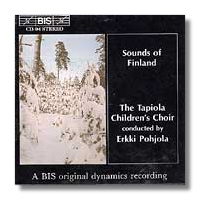
The Internet's Premier Classical Music Source
Related Links
-
Sallinen Reviews
Rautavaara Reviews
Sibelius Reviews - Latest Reviews
- More Reviews
-
By Composer
-
Collections
DVD & Blu-ray
Books
Concert Reviews
Articles/Interviews
Software
Audio
Search Amazon
Recommended Links
Site News
 CD Review
CD Review
Sounds of Finland

- Aulis Sallinen: The Winter Was Hard
- Einojuhani Rautavaara: Marjatta, Lowly Maiden, Finnish Mystery
- Friedrich Pacius: 2 Songs
- Jean Sibelius:
- 2 Songs
- The Snow Is Falling
- Jorma Panula: Evening Song
- Jukka Koskinen: To Us a Festival is Given
- Mooses Putro: Prayer
- Pekka Juhani Hannikainen: 2 Songs
- Toivo Kuula: Evening
- George Frideric Handel: Rejoice, Daughter of Sion
- Michael Praetorius: Let Us Chant
- Johann Sebastian Bach: 2 Songs
- Anonymous/Traditional:
- I Kneel Down at your Manger
- In the Hay by the Oxen's Through
- Maria, the Lord's Little Maiden
- Oh Nightingale, Come!
- 3 Japanese Songs
- Burro Matti, Lapin jojku
Tapiola Children's Choir/Erkki Pohjola
BIS CD-94 ADD 74:55
Forget the Vienna Boys' Choir or King's College, Cambridge: if you want your angels to be real musicians this holiday season, then your best choice is the Tapiola Children's Choir from Finland. Erkki Pohjola founded the choir in 1963, and it didn't take long before it was winning international competitions. Its achievements are even more remarkable when one considers that 1) Erkki Pohjola never sang in a choir and never had formal training as a choir director, and 2) the choir rehearses for only two and a half hours each week. Each member of the choir plays a musical instrument, and the choir never has used an adult accompanist. Adult composers have been eager to write music for "The Tapiola Sound," however, and some of this new music is of a technical difficulty that would give the best adult choirs pause. The accuracy and control of their singing is exceptional, and Pohjola has worked to make their tone richer and fuller than that of any other children's choir.
Sounds of Finland was recorded in 1977 and 1979. Not all of the works are Finnish: there are virtuosic arrangements of three Japanese folk songs, and choruses by J.S. Bach, Handel, and Praetorius. Most of the selections on this disc are short - no more than two or three minutes long - and several of them are specifically appropriate for Christmas. The disc opens with Sibelius's arrangement of the "Finlandia Hymn," the noble melody that he used in his more famous work for orchestra. As sung by the clear-toned voices of the Tapiola Children's Choir, it is powerfully moving lump-in-the-throat material for Finns and non-Finns alike.
The disc closes with an unusual twenty-two-minute mystery play by Finnish composer Einojuhani Rautavaara. Marjatta, matala neiti retells the nativity story as a Finnish folk tale: Marjatta (Mary) is a shepherdess who conceives a child after eating a talking lingonberry. When it becomes time for her to deliver, there's no room in the sauna and so she is sent out into the cold. Finally, she gives birth to her child in a manger, warmed by the heavy breathing of a benevolent horse. Sounds silly? It's absolutely charming, and the composer is the narrator in this performance.
BIS's analog originals are as splendid as their digital recordings, and the booklet includes full texts and translations. After having heard this CD, you will want to hear other recordings by the Tapiola Children's Choir; Dreams on Ondine ODE786-2 is particularly interesting, since it presents the choir in very challenging modern material, including Bengt Johansson's fearfully difficult Pater Noster.
Copyright © 1996, Raymond Tuttle


















